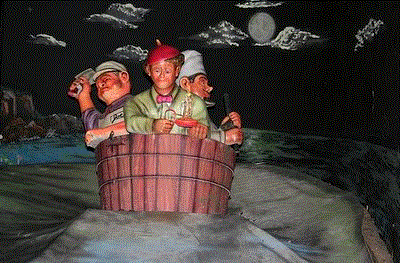Posted by Whistler 800 words
The original version of the rhyme ‘rub-a-dub-dub’ supposedly tells of three townsfolk watching a dubious sideshow at a fair. Later versions talk of them being ‘all put out to sea’, perhaps a reference to being ‘at sea’ or puzzled or bewildered (thanks Wikipedia). I think either version could work for some of our councillors today.
Councils usually have greater gender balance and occupational representation than in the rhyme. My question is, who are the people who become councillors? What attracts them to the role? Why do they do it? What do they offer? Do they really reflect the communities they represent?
Many of the councillors I have worked with closely have been passionate and highly motivated to work in the interests of their community. Often they represent a specific interest and have sought election to advocate for it– raising disability awareness, increasing environmental protection, preventing over development, better sports facilities, better representation for businesses, reducing traffic congestion, providing services for the socially disadvantaged, giving a voice to new cultural groups, etc. This single interest focus can create tensions in the beginning but usually fades as the context for pursuing their interest becomes evident. The ‘plurality of interests’ they must represent becomes apparent to them.
Of course, there are some councillors who are elected simply to be a councillor. Their interests can be more personal – aspiration to higher political office, recognition as a community leader, a natural progression in their community life, etc. This can be good or bad. I have been told that in rural areas councillors are usually community leaders from service clubs or sports clubs or other community organisations who become councillors. In comparison, in metropolitan areas people are elected to council to be community leaders.
I was reading an Ian Rankin ‘Inspector Rebus’ novel the other night (as I am wont to do on a wintery night) and it involved local government in Edinburgh:
“ … you find that councillors tend to fall into one of several groups: retired, unemployed, self-employed, or with an affluent spouse.
‘The first two because they’ve got lots of time, the last two because they can make time?’
She nodded. ‘Result? A lot of councils are not what you’d call dynamic.” p.82 Let it Bleed
It seems that in Scotland there are characteristics of councillors that are shared with some parts of Australia.
Of course, when you elect a group of unaffiliated people and ask them to work as ateam to make decision, there are bound to be some difficulties. If you talk to some long-term local government observers they propose limiting representative democracy and having part of the council (less than half) appointed, not elected.
I think their intention is to ensure that at least some of the councillors have the ‘business’ skills and experience to run a large organisation. Some of the glaring skills gaps are the inability to plan for CEO succession (in his book Claudio Fernández-Aráoz says this is not uncommon for the boards of major companies) and the ability to hold the organisational accountable for delivering public value. It would be helpful if they also understood the implications of taking so much of the CEO and senior manager’s time in managing their idiosyncratic, and occasionally dysfunctional, individual and group behaviours.
The obvious question is who would appoint them and what interests would they then represent. In Victoria we have experienced State government appointed administrators, mostly to the detriment of community interests. If there was a way for each community to select them it might work. I think most councils would realise they are short on commercial or business skills and experience, which makes them reliant on the CEO and administration for advice, the success of which then depends on the level of trust that exists. And it doesn’t always exist.
It is worth asking how councillors are able to survive with limited skills. If they weren’t allowed to indulge themselves in extraneous detail and they were made more publicly accountable for setting policy and providing strategic direction, they might struggle. Then better people would step up to the job and do what councillors are expected to do and hold the organisation accountable for providing public value .
Fernández-Aráoz, Claudio 2014. ‘It’s not the How or the What but the Who – Succeed by Surrounding Yourself with the Best’.
Rankin, Ian 1995. Let it Bleed – An Inspector Rebus Novel.
 What does Captain Council think? Unfortunately, too many councillors without skills or ability, or even good intentions, have been elected over recent years. I think many of my colleagues suffer from relevance depravation. All too often they are so intent on raising their public profile that they don’t really care what the issue is – so long as it grabs a headline.
What does Captain Council think? Unfortunately, too many councillors without skills or ability, or even good intentions, have been elected over recent years. I think many of my colleagues suffer from relevance depravation. All too often they are so intent on raising their public profile that they don’t really care what the issue is – so long as it grabs a headline.
Councils do select CEO’s who won’t tell them they can’t have what they shouldn’t have or do what they shouldn’t do. We don’t want to take advice and prefer to play games and argue with each other, even if it diminishes our council’s image. Residents usually don’t care which councillor started it or who is right or wrong.
I think that the answer lies in electoral reform to inject some professional skills into the mix of community views represented by councillors. As I have worked out, not every councillor has the superpowers necessary for success.
CC.
